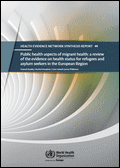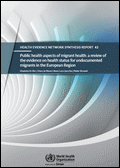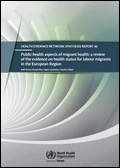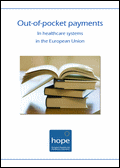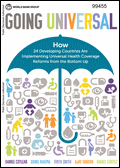 SELECTED FOR YOU... NOVEMBER 2015
SELECTED FOR YOU... NOVEMBER 2015
 books of the month
books of the month
 watch on health economics
watch on health economics
All the Selected for you
BOOKS
Public health aspects of migrant health: a review of the evidence on health status for undocumented migrants in the European Region.
Bradby H., Humphris R., Newal D. et al.
Copenhague : Office des Publications du Bureau Régional de l'Europe, 2015/10
Refugees and asylum seekers are defined in many ways, but can be considered as those who did not make a voluntary choice to leave their country of origin and cannot return home in safety. Outcome data are limited and mostly focused on perinatal and mental health but do suggest significant levels of unmet need. This scoping review considered 72 studies in which refugees and asylum seekers formed part or all of the population studied. The results show that access to appropriate health care across the WHO European Region is very varied and is overwhelmingly shaped by legal frameworks and the regulation of the migration process. The need for improved communication with asylum seekers and coordinated action between agencies within and beyond the health care system is widely noted. Improved data are imperative to support intersectoral work to address the health care needs of asylum seekers and refugees.
Public health aspects of migrant health: a review of the evidence on health status for undocumented migrants in the European Region.
De Vito E., De Waure C., Specchia M.L., et al.
Copenhague : Office des Publications du Bureau Régional de l'Europe, 2015/10
Undocumented migrants are people within a country without the necessary documents and permits. They are considered at higher risk for health problems because of their irregular status and the consequences of economic and social marginalization. A systematic review found 122 documents that suggested policies and interventions to improve health care access and delivery for undocumented migrants. Undocumented migrants mostly have only access to emergency care across Europe, and even in the countries where they are fully entitled to health care, formal and informal barriers hinder their access. This raises concerns for both public health and migrant care. On the basis of findings, policy options are suggested regarding data collection, research, entitlement to health care, information and communication, training and intersectoral approache.
Public health aspects of migrant health: a review of the evidence on health status for labour migrants in the European Region
Simon J., Kiss N., Laszewska A., et al.
Copenhague : Office des Publications du Bureau Régional de l'Europe, 2015
Labour migrants form one important subgroup of international migrants. In 2010, labour migrants constituted 7.2–9.5% of the total working population in Belgium, Germany, Greece, Spain and the United Kingdom, and the number of labour migrants in the Russian Federation was estimated at 7–9 million in 2005. With labour migration at such a massive scale, provision of health care for this group has become an increasingly important issue within the WHO European Region. This report focuses on labour migrants specifically, irrespective of documentation status: those seeking work, those employed in the host country, and those who were previously employed or are seeking work but are unable to continue working or find work and remain in the host country. The objective of this report is to address the following question by way of a systematic review of the English language literature: What policies and interventions work to improve health care access and delivery for labour migrants in the European Region?
Out-of-pocket payments In healthcare systems in the European Union
European Hospital and Healthcare Federation. (H.O.P.E.). Brussels. BEL
Bruxelles : HOPE, 2015/09
Hospitals are by essence a field where solidarity is of utmost importance, insuring the most costly risks. In the context of the crisis, one of the main worries is that choices would be made to reduce the coverage of such risks. The scope of the present work is first to know whether it is possible to have a clear picture on what out-of-pockets payments are, and then to try to understand if and how such policies affected solidarity in the healthcare coverage.
Going universal: How 24 developing countries are implementing universal health coverage ? Reforms from the bottom-up.
Cotlear D., Banque Mondiale. Washington DC. USA, Nagpal S., Smith O., et al.
Washington : Banque Mondiale, 2015
The book analyzes dozens of policy decisions at country level that shed light on how Universal Health Coverage programs are implemented in countries around the world, for which appendix B offers some background. The data collection tool for the analysis comprised a common “Nuts & Bolts” questionnaire with nine modules (appendix D). Its modules collected information on a country's health system, detailing information on the UHC program. The unit of analysis is the UHC program, not the entire health system, although much contextual information on the latter was collected. This program approach is used to focus on what is new or changing, because this is where reforms are concentrated. While this approach may run the risk of losing sight of the “system” once we dive into the details of a program, its advantage is that it allows for a much deeper understanding of how nascent UHC programs are functioning and changing. In addition, the UHC programs are often serving to leverage broader reform of the health system, in effect blurring the distinction between program and system.
